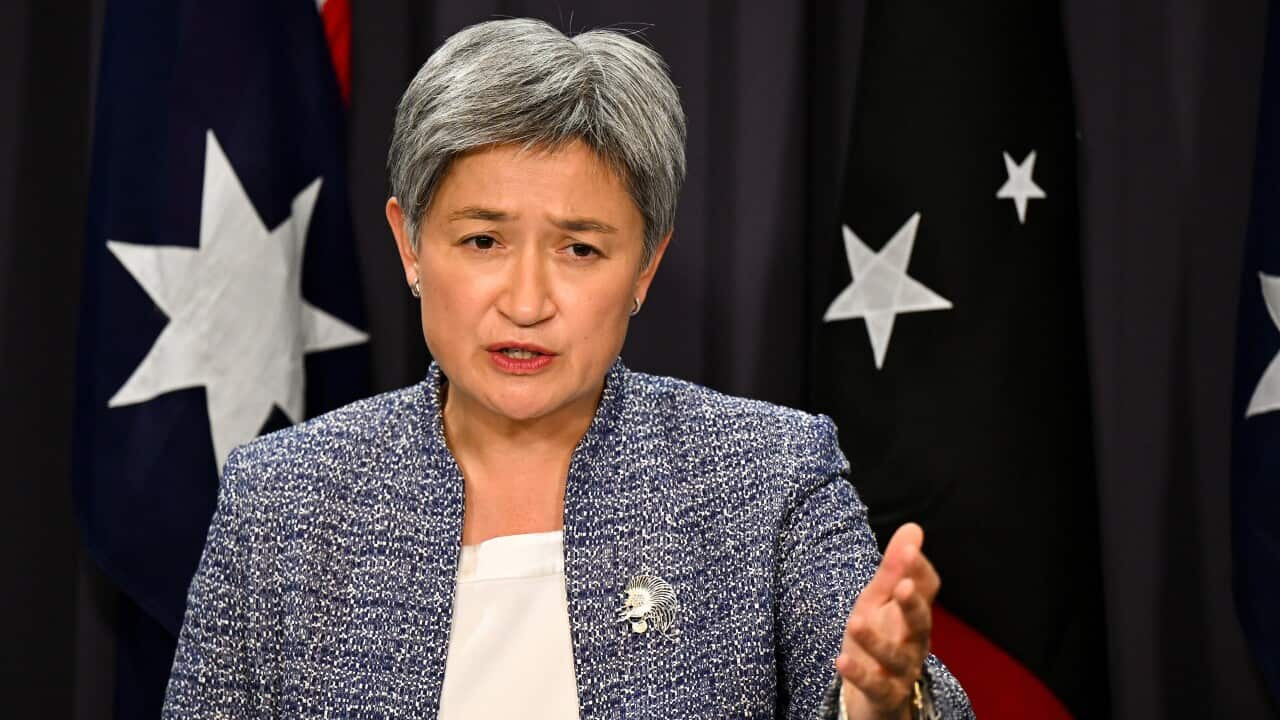KEY POINTS:
- More than 100 Australians remain in Sudan, despite 36 boarding an RAAF flight overnight.
- Foreign Minister Penny Wong has told SBS News the situation is 'changing rapidly'.
- Without a consular presence in Sudan, Australia has been heavily reliant on allies to rescue its citizens.
Further rescue flights from Sudan cannot be guaranteed, and more than 100 Australians stuck in the war-torn country may need to escape by boat, Foreign Minister Penny Wong says.
Senator Wong has also warned the situation in Sudan is "changing rapidly", but accepts Australia is heavily reliant on allies to help its citizens flee the country.
has intensified in recent days, with a notional ceasefire flouted as heavy artillery continues to pound the capital Khartoum. At least 500 Sudanese civilians have been killed since the conflict erupted three weeks ago, when a paramilitary group attempted to seize control of the country.
A Royal Australian Air Force and their family members from Sudan on Tuesday night, a flight that also carried citizens from six other countries. But most of the 191 Australians who have escaped had boarded flights organised by its allies.

A house in Khartoum damaged in the fighting. Source: AP / Marwan Ali
But speaking to SBS News on Wednesday, Senator Wong said a lack of consular assistance in Sudan meant Australia was heavily reliant on allies - particularly the United Kingdom - to whisk its citizens from danger.
“The dynamic on the ground is changing rapidly, which is why we focused on doing what we could as quickly as possible," she said.
"I understand how distressing this is, and how stressful this is as the security situation has deteriorated. But what I would say is this: We don't have an embassy in Sudan, as in many other parts of the world.
"So what we do is rely on our friends and partners in those parts of the world."
Penny Wong says boats may be needed, ceasefire broken
The situation in Khartoum has worsened in recent days, despite the two warring factions publicly agreeing a truce to allow an estimated one million people trapped in the city safe passage out.
The total number of Australians stuck in Sudan remains unclear, and Senator Wong urged any seeking to flee to register on the DFAT website.
Around 140 are currently registered, though the number from within that cohort seeking to leave is not known.
The UK has managed to carry out more than 2000 people across 23 flights, though the BBC reported evacuation flights have ceased as the country's efforts switch to humanitarian aid.
"We knew that it was much more effective for us to focus on working with partner countries to gain access to flights and to convoys, and ferries for those who wish to leave," Senator Wong said.
"We are obviously looking at whether there is the possibility of another flight, or whether we have to focus entirely on ferries. [That] has been a way in which people have been evacuated to date as well."
Thousands of civilians have been to flee via boat across the Red Sea from Port Sudan to the Saudi Arabian city of Jeddah - a voyage than can take up to 12 hours. The Saudi Royal Navy has been ferrying people across, but it's struggling to keep up with demand.
The conflict erupted in mid-April, when paramilitary group Rapid Support Forces launched a series of attacks on army bases across Sudan, and laid siege to the presidential palace.
A seven-day ceasefire was immediately undermined by airstrikes continuing to rain down on Khartoum.
The United Nations' (UN) refugee agency said it was fleeing as a result of the conflict, with over 70,000 already having made their way over the border.
But UN commissioner for refugees Filippo Grandi warned efforts to help civilians would be hampered "unless we receive stronger guarantees of safe access".



